The fires are everywhere
On living in an LA in flames, our degraded information ecosystem, and trying to put out fires now and in the future
This one may be more scattered than most, as there is, maybe obviously, a lot going on. TLDR; my family has left LA due to the wildfires, mostly to escape the terrible air quality, but we are safe and fine and our home is OK too. Thanks to everyone who has already sent in kind words of support and offers of assistance, I am grateful to you all.
There were so many things I was going to write about this week, as the pile of Significant Events stacked up one after another over the holidays, most of them foreboding. There was Elon Musk tanking legislation he disliked by posting on X. There was Sam Altman promising OpenAI would create AGI and replace workers very soon, quietly building the case they will need even more capital, please, to make it happen. There was Mark Zuckerberg announcing the end of fact-checking and serious content moderation on Facebook, Threads, and Instagram, in the latest sign that social media networks are to be run like misinformation-strewn autocracies.
There was an exploding Cybertruck at a Trump hotel, blown up by an unwell man who appears to have been a fan of Musk and Trump, celebrating the world they are building with a macabre and tragic demonstration. What else could you even ask for, symbolism-wise, if you write a newsletter called Blood in the Machine.
But now there’s a wildfire burning less than a ten minute drive from my house, something hundreds of thousands of Los Angeles residents can accurately type at this moment, and for perhaps the obvious reasons, that has been pretty much all I’ve been able to think about.
Not just because of its physical omnipresence, or that there are the logistical considerations—do we leave, do we take the kids out of school and the horrible air quality and head out, when do we leave, do we wait to see if they close the schools, and bunker down and crank up the air purifier? do we boil the tap water, as a robocall from the city instructed us to do if we live close to the evacuation zone? do we panic?—but also because it is such a violent, symbolic emanation of the world that has been thrust on us and that we are slouching towards being somehow even more thrust into. Does that even make sense? I’m not sure it does. But I am sure enough that this is a world where the fires are everywhere, from exploding Cybertrucks, bombs falling on Gaza, embers cast into cities parched by climate change, and where all of those fires are only being doused with more gasoline by those who have thrust us here.
I live a few miles away from the evacuation zone in Santa Monica, and you can see the smoke billowing from the Palisades fire past the freeway. The sky is dark, though the 80 mph Santa Ana winds sometimes cut a band of blue sky underneath the plume.
There are few cars out on the roads when I go out for a walk on Wednesday; the traffic-chocked streets are ghostly quiet, a lot like they were during the pandemic, though the sound of sirens is semi-constant in the background, on the highway 10 and beyond.
I walked around the neighborhood, and one of the only cars I encountered was a Waymo, which idled on the side of the road without a passenger for as long as I stayed to watch it.
A tech giant’s driverless car, idling under the grey ember skies of a nearby raging wildfire. That’s something, right?
The question remains: What to do? The kids are still in school, where the air filtration is pretty good indoors—thanks Covid, thanks LAUSD—but everywhere else it’s awful. So we wait.
I still check X, instinctively, when there’s a crisis or major news event, because it was formerly useful back when it was Twitter. It’s a habit. It’s a mistake.
Musk, who of course also owns the company that makes the Cybertruck that was burst into flames in Vegas, was busy demanding, on the platform he controls, that, in the midst of disaster, everyone pay further attention to him, as he made and promoted calls from right wing media personalities for Gavin Newsom to resign, unhinged broadsides against DEI, and encouraged doubt on climate change’s role in the wildfire itself. (Yes, Musk, who built his empire by selling electric cars to liberals worried about climate change, is now actively minimizing the severity of climate change.)
This platform, which used to surface decent information and updates, calls to coordinate community aid, and foster connection between users and residents, was doing what it does best now—serving up a glut of angry, anti-woke posts, conspiracy theories, and posts from Elon himself doing all that too. Here’s the richest man in the world, with more power and influence than anyone, who owns a massive digital communication network, arguably has more capacity to help out than nearly anyone, instead picking petty fights, fanning hate, and indulging grievances. The fires are everywhere.
I download the Watch Duty app. My phone is fully charged, in case we have to leave. I make us a sad little go bag, with pretzels, some oranges, water, and protein bars. My wife and I laugh about it later; the recommendation is for two gallons of water per person; I packed one water bottle and a can of seltzer.
Six years ago, give or take a couple months, we brought my newborn son home from the hospital amid actual falling ash from the Woolsey fire in Malibu. There is no way you can ignore the implications of something like that: This is the world that you are being born into, you can surely feel it in your tiny lungs.
I permitted myself a sliver of hope anyway, one that is getting harder by the day to retain. For instance, the climate journalist Brian Kahn pointed out that researchers have found that the growth rate of the fastest wildfires—like Woolsey, and like Palisades—is now 250% faster than they were twenty years ago. They are so much more common. As the meteorologist and climate writer Eric Holthaus put it in the Guardian, “the Los Angeles wildfires are climate disasters compounded.”
The firefighters run out of water in the Palisades, the hydrants are dry. We get word: LAUSD is shutting down the schools. For us, that’s it—we are fortunate to have family down towards San Diego, so after dinner we pack up the car and go.
I am stewing not only in my little ossified rage over the climate crisis, at the usual suspects, who have in my mind blended into a nebulous amalgam of dull-eyed evil; the oil executives and fossil fuel companies and opportunistic politicians etc that I can summon and angrily dispense with as though checking a box on a form. I am also thinking about the utter fragility of those tools that have helped us to adapt in at least some small ways to this new era—tools like Twitter that can be broken in a matter of months if the wrong billionaire buys them.
I’m thinking of how little progress we’ve made in addressing the root causes of the climate crisis, of course, and how adept our elites have become at kicking the can down the road. I’m thinking of how it is in vogue in Silicon Valley to argue that AI will “solve” the climate crisis. And also how, while AI is obviously not the reason wildfires reign over LA every other year, it fairly neatly embodies the ethos that got us here: A technological solution will bail us out, if the problem is worth addressing at all, and in the meantime, we can burn even greater quantities of fossil fuels until we figure it out. This argument is invariably made by rich men who will be best insulated from the fallout of more and worse wildfires.
I’m thinking of how, six years ago, I still permitted myself some hope, and I realize I still do. Strangers are opening their homes to refugees. People are assisting the elderly in escaping from blazes and donating to animal shelters. Steve Gutenberg is moving cars to let emergency vehicles pass. It’s in there. But if anything, there’s more work to be done now than there was six years ago. Fighting the climate crisis now means taking back the information ecosystem. Opposing the tech oligarchy taking root in Washington. Putting out all the fires whose spread only serves the interests of the men who own the infrastructure that undergirds our lives, and who consider themselves safe from their flames.
My friend Jason wrote this nice and grim piece about leaving the fires—spoiler, it is me, I am the one who claims to be “fine” in the group text, or I am at least one of them—and I will say that I am not quite lying to myself about climate disaster, as he puts it. The fear is that it would be something closer to resignation, but I don’t think I’m anywhere near there yet. I’m too angry. Agitated, as my partner might put it. But that can be useful, I think.
I started writing this thing, whatever it is, on Wednesday, after the fires broke out and spread, and I’m finishing it on Thursday, under the safe blue skies of my in-laws’ house. I do feel a little guilty about leaving, and we are so privileged to be able to do so, but I don’t want my sons to feel any more of that ash in their lungs than they have to. They will be subjected to plenty of fires in the future.



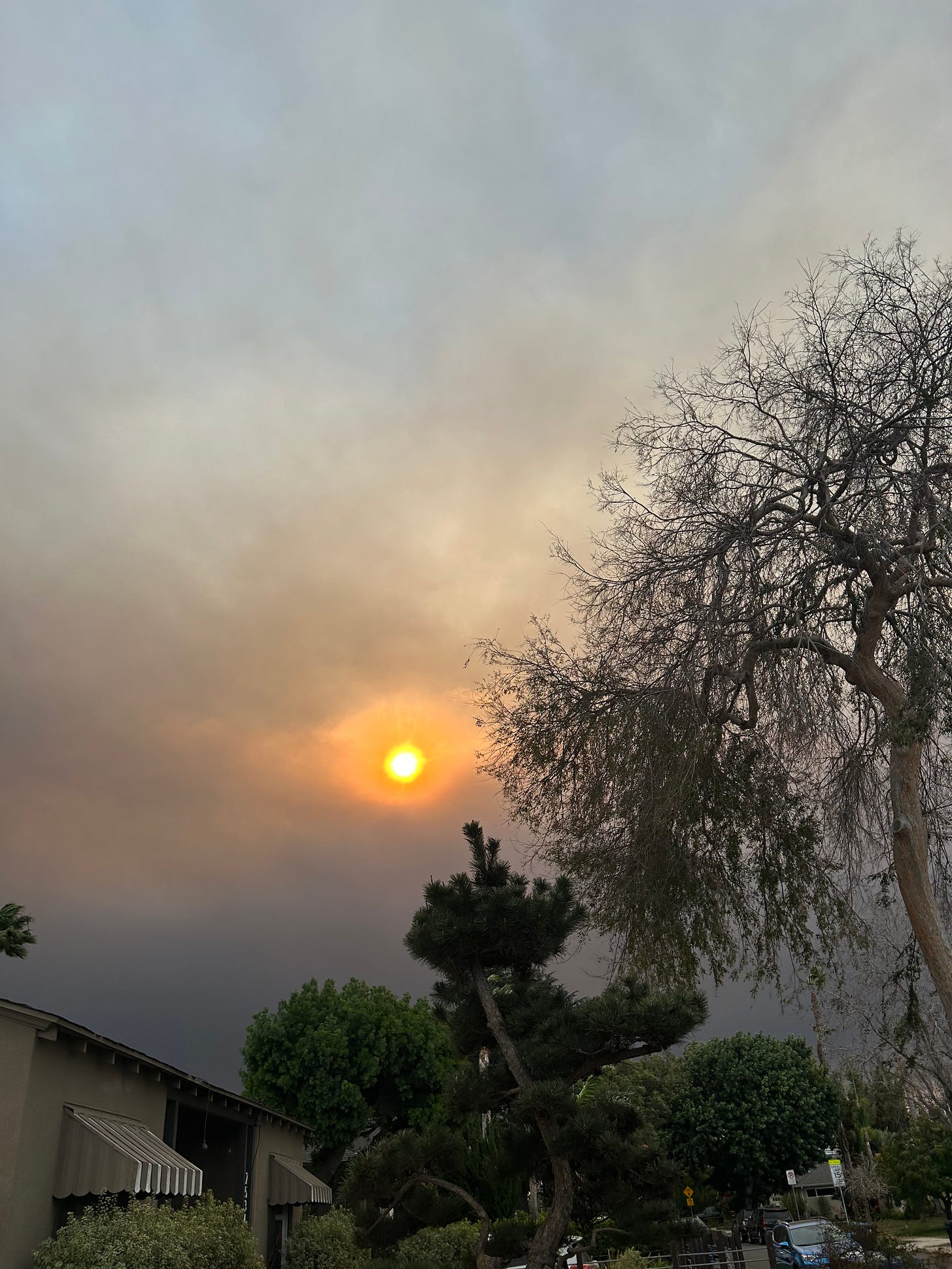

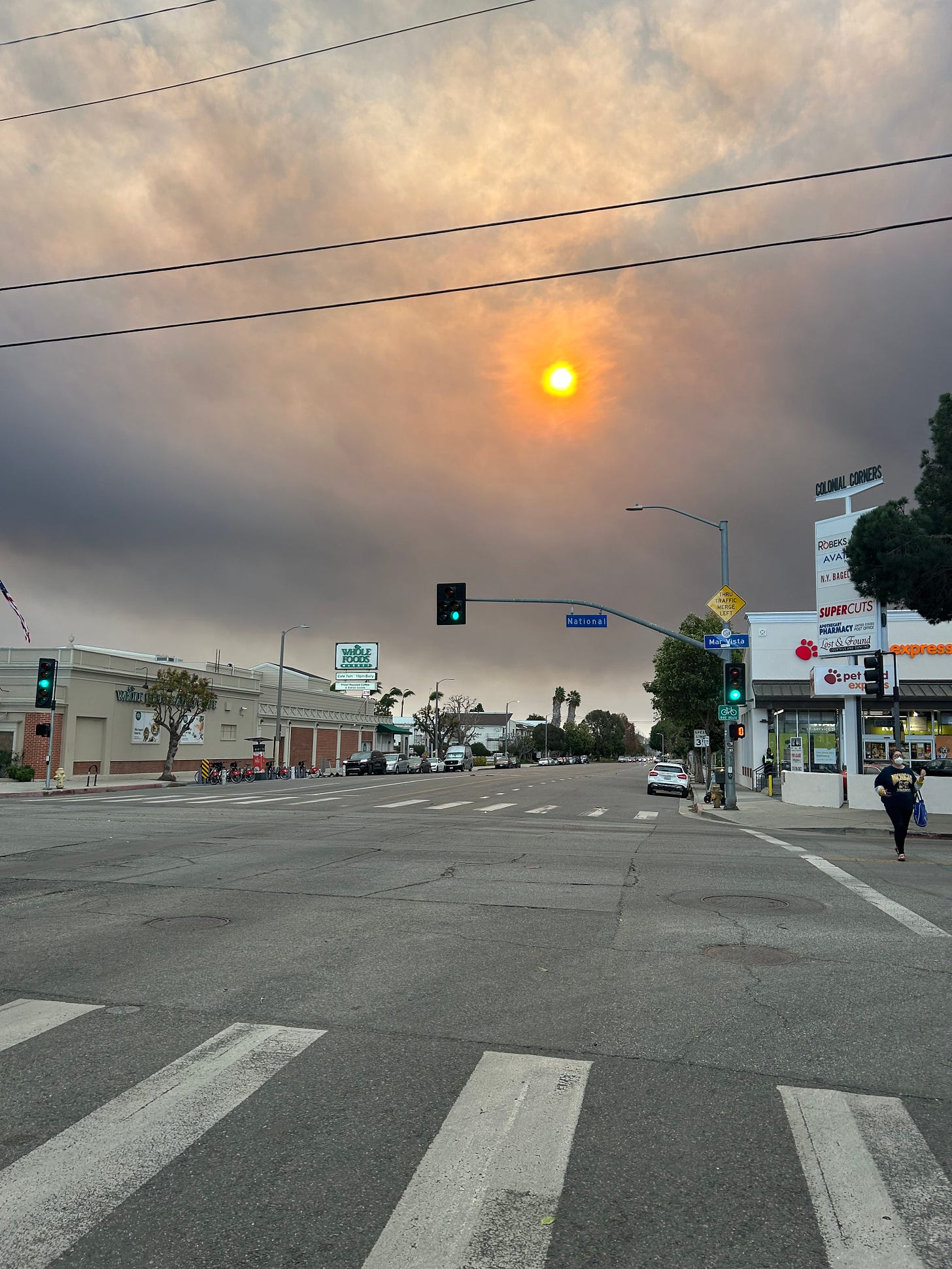
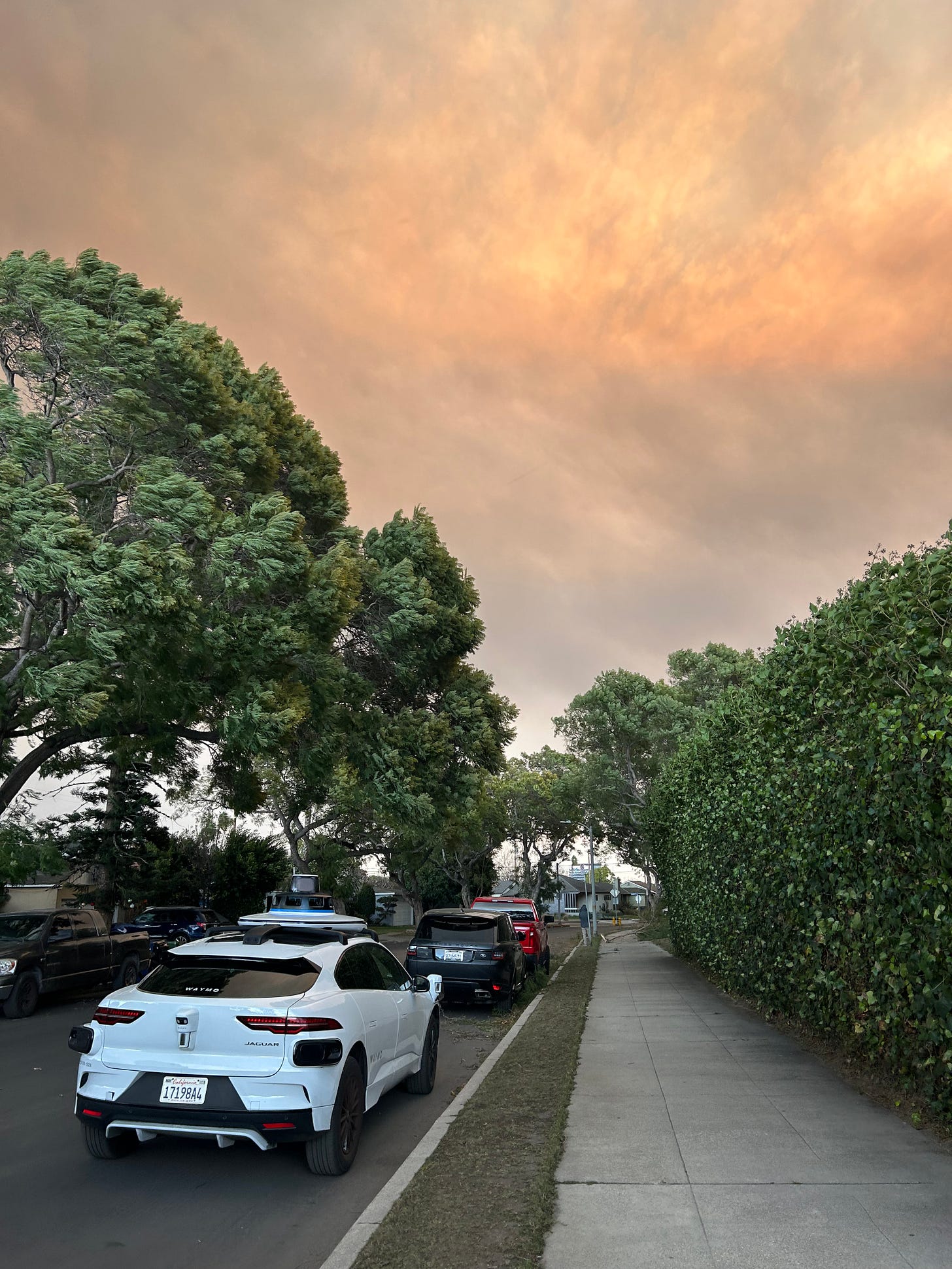
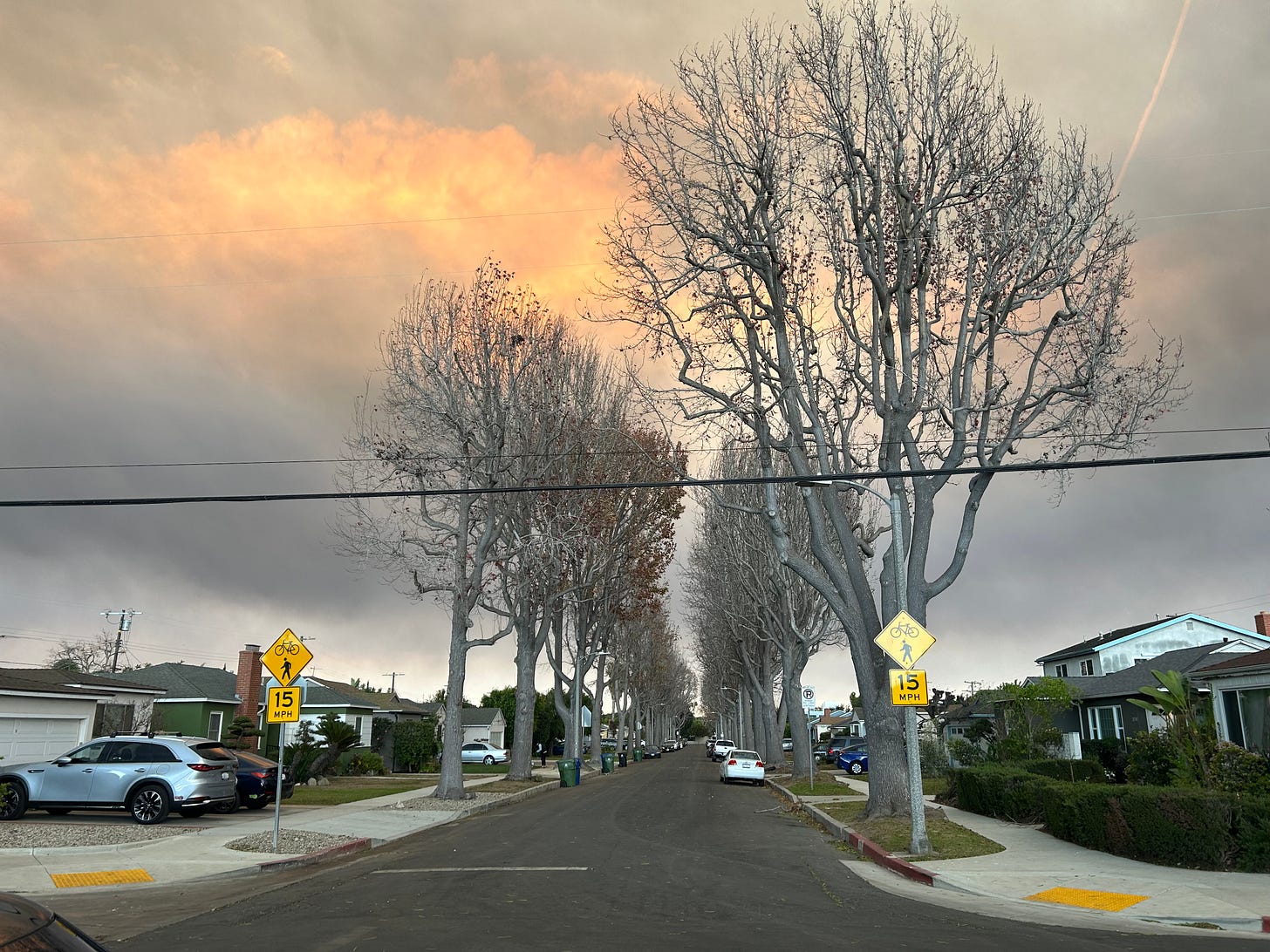
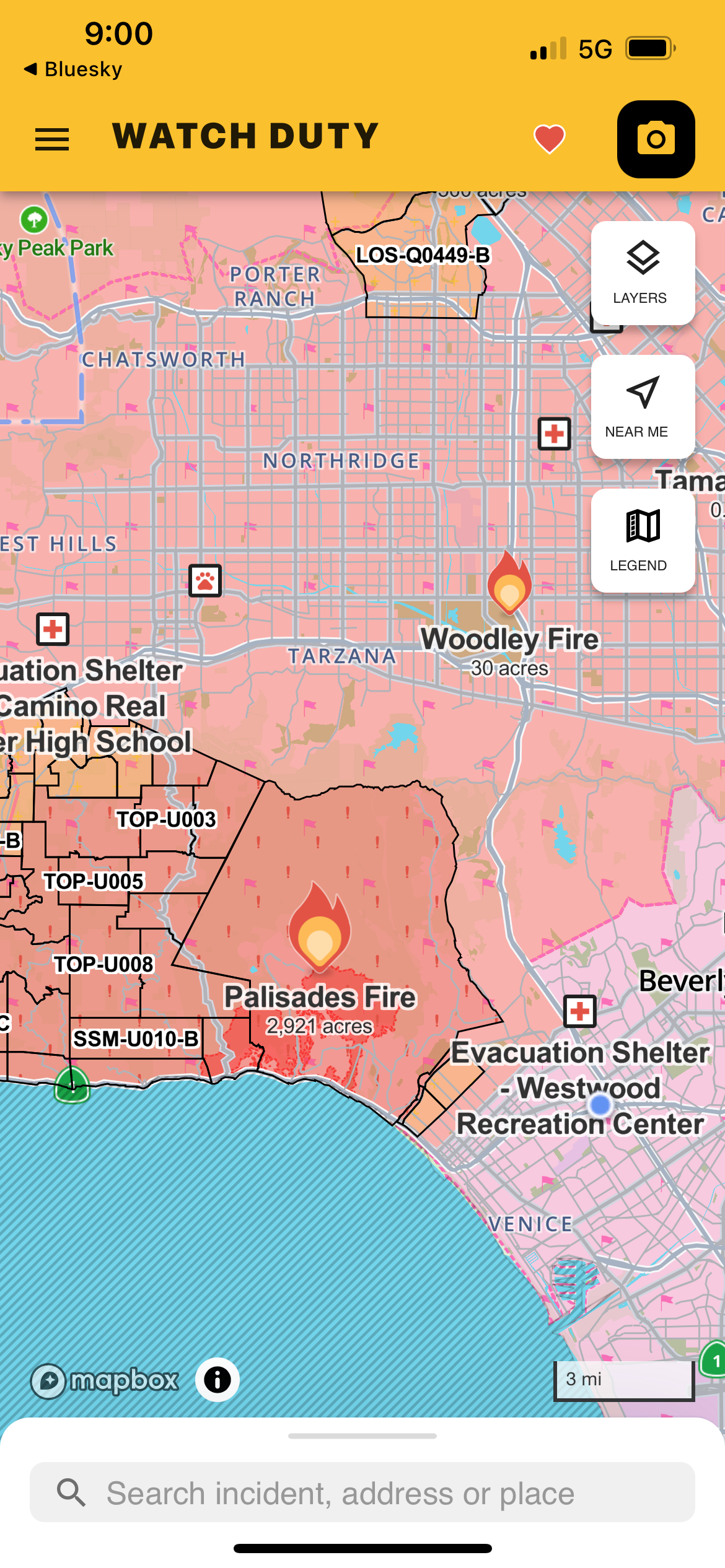
Thank you for the insights. I wish you all the best from Germany. The race has just begun We can't bow down to that shit.